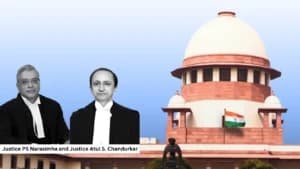In a significant judgment, the Supreme Court has clarified that a person appointed to the State Waqf Board as a Muslim member of the State Bar Council cannot remain in the Waqf Board once their Bar Council membership ends.
This ruling came while interpreting Section 14 of the Waqf Act, 1995 (prior to the 2025 amendment). The section allows the appointment of a Muslim Bar Council member to the Waqf Board. However, the Court emphasized that this membership is dependent on the individual’s continued position in the Bar Council.
"Without such membership in the Parliament, or the State Legislative Assembly or the Bar Council, the very basis for their membership in the Board ceases to exist," the bench remarked.
A bench of Justice MM Sundresh and Justice Rajesh Bindal was hearing an appeal against a Manipur High Court judgment from November 2023. The High Court had held that even after the Bar Council tenure ends, the individual could remain on the Waqf Board. This decision was challenged by the appellant, who was newly appointed by the Manipur Government to replace a former Bar Council member on the Waqf Board.
The High Court based its reasoning on Explanation II to Section 14, which says a Muslim MP or MLA loses their Waqf Board membership when their legislative term ends. The High Court claimed this clause did not apply to Bar Council members.
However, the Supreme Court disagreed. It ruled that this explanation cannot override or become the sole basis for interpreting the main part of the law.
"To interpret a legislative provision, what must be primarily considered is its substantive part. An explanation simply performs a clarifying function," the Court stated in the judgment authored by Justice Sundresh.
Read Also:- Supreme Court Confirms Hospital's Vicarious Liability in Medical Negligence Case Leading to Patient's Death
The Court also addressed a reference to the Bombay High Court's ruling in Shri Asif v. State of Maharashtra, where a Bar Council member was allowed to continue in the Waqf Board after his Council term ended. The Supreme Court firmly rejected this decision, calling it incorrect.
"An explanation, which is simply in the nature of a clarification as regards certain categories, cannot be read in a manner which is violative of the substantive part of the provision," the Court noted.
Importantly, the judgment also mentioned that if a Muslim Bar Council member is available, a former member cannot continue on the Waqf Board.
"It is axiomatic to state that an existing Muslim Member of the Board from the Bar Council, would cease to be a Member of the Board, upon the completion of their tenure as a Member of the Bar Council."
In the present case, the State of Manipur had appointed the appellant based on a gazette notification confirming his membership in the Bar Council. Hence, the Court upheld the State’s action, stating that the respondent, who had ceased to be a Bar Council member, had no right to continue on the Waqf Board.
Finally, while setting aside the High Court’s decision, the Supreme Court also held that the Bombay High Court judgment in Shri Asif is not a good precedent.
Case Details: MD. FIROZ AHMAD KHALID v. THE STATE OF MANIPUR & ORS. | SPECIAL LEAVE TO APPEAL (CIVIL) NO.2138/2024















